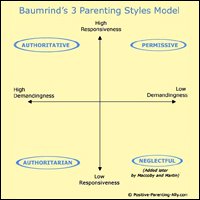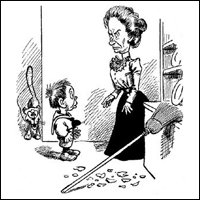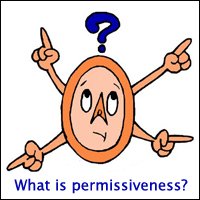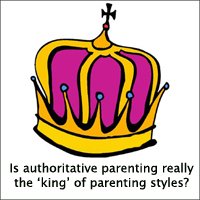The Psychological Nature of the Permissive Parenting Style:
Going Beyond Diana Baumrind
Here you'll get:
• A presentation of the permissive parenting style as it was originally conceptualized and defined by the all time famous developmental psychologist Diana Baumrind.
• A discussion and critique of Diana Baumrind's idea of ' low demandingness' or absense of 'disciplinary efforts' as being one of the key elements that defines permissive parenting.
• An understanding of some of the existential reasons behind indulgent parenting: What may be the reason behind permissive parenting?
Confusion Reigns When Defining
'What Is Permissive Parenting?'
 Trying to find a universally applicable definition of permissiveness in relation to parenting is confusing to say the least.
Trying to find a universally applicable definition of permissiveness in relation to parenting is confusing to say the least.
What some people will call permissive parenting other people will simple label as attachment parenting or positive parenting.
So how do we approach this seemingly elusive definition of the permissive parenting style?
Well, since everybody seems to have their own definition (including me) of permissiveness, there cannot be any objective truth, any universal forever valid definition.
Okay, what do we do then?
Well, what we can do is that we can attribute different theories to different people and in that way create some sort of coherence and order in our minds.
First, let's see what developmental psychologist Diana Baumrind has to say about permissive parenting.
Diana Baumrind's Definition
of the Permissive Parenting
Diana Baumrind's definition of the permissive parenting style is derived from her 1960s child care study of behavioral interactions between parents and their children. Her definition is based on a large body of empirical observations and interviews of white middleclass families.
According to Baumrind, the following behavior patterns are characteristic of permissive parents:

- Strive to accept and meet as many of the child's needs and desires as possible: Permissive parents work towards being very attuned to their child and take on an accepting and affective attitude towards their child's needs and desires.
- Few behavioral expectations: Permissive parents don't have high expectations of behavioral standards (like for instance authoritarian parents do). Permissive parents expect a child to behave according to his or her age (the younger, the more 'childish') and there are typically very few rules and no imposed household work.
- Flat hierarchy - role equality: The child is included and has a voice in family decisions. Children are encouraged to present their opinions and discus their viewpoints. Reasons for rules are explained to the child with the use of logic and fairness.
- Parents are a resource rather than role model: Rather than being a parent that tries to shape and mold his or her child according to set standards via control measures, the permissive parent's goal is to be available whenever the child needs it.
- Encourages self-regulation: Permissive parents avoid intervening and using overt control or disciplinary measures believing that the child should learn through experience rather than through rules.
- Use of reason and manipulation: Permissive parents don't use overt control or force to make the child do what is wanted. Permissive parents would rather try to explain the reasons behind their actions or try to manipulate the child via e.g. bribes.
According to Diana Baumrind and other later researchers, permissive parenting may have the following effects on children:

- They may become selfish and bossy: Because of the lack any of parental control or discipline, the child has learnt nothing about respecting other people's needs. The potential experience of wavering, conflict scared parents may lead the child to become bossy or dominating because he or she is searching for limits and boundaries.
- They may feel insecure: A complete lack of limits, absence of authority figures, no consistent routines or predictability may lead to a sense of insecurity in the child: "How far can I go and what can I count on?"
- They may become impulsive and experimentative: Because of the installed beliefs that the world is open for experimentation and that there are very few 'musts', children of permissive parents are found to be more impulsive and involved in 'problematic' behavior such as drug and alcohol use and do less well in school than kids from authoritative and authoritarian parents.
Research has shown that kids of permissive parents typically are well equipped in dialogue, have high social skills, high self esteem and low levels of depression.
This was a very quick presentation of Diana Baumrind's main points of the permissive parenting style.
I would now like to take this article a step further and take a look behind the scenes by discussing and questioning some of Baumrind's analytical tools and claims.
Diana Baumrind's Analytical Definition
of Permissive Parenting:
- High Responsiveness - Low Demandingness!
Diana Baumrind had two behavioral measuring tools that she used when making her model of her 3 parenting styles which included authoritarian parenting, permissive parenting and authoritative parenting.
The first analytical tool Diana Baumrind used was measuring the parents' level of 'responsiveness': The extent to which the parents were attuned to and supportive of their children's needs and demands.
The other tool Baumrind employed was measuring the parents' level of 'demandingness': The level of behavior control and discipline efforts that the parents exercise on their kids. These control measures were based on the parents' expectations of appropriate and 'mature' behavior.
According to Diana Baumrind the permissive parenting style is high on 'responsiveness', a good human virtue she approved of.
However, the permissive parenting style is low on 'demandingness' - something which Baumrind makes quite clear she thinks is problematic.
According to Diana Baumrind, the ideal combination is high responsiveness and high demandingness: a combination found in what she coins authoritative parenting.
Authoritative parenting represents her idea of an ideal parenting style.
I don't necessarily find that Baumrind's idea of authoritative parenting is ideal. One of the reasons for this is that I don't agree with her strong emphasis on high demandingness, control and discipline.
This is why:
The Problem of Using 'Demandingness'
as Measuring Tool!
This is how Diana Baumrind defines demandingness:
- "(...) the claims parents make on children to become integrated into the family whole, by their maturity demands, supervision, disciplinary efforts and willingness to confront the child who disobeys". (Baumrind, 1991).
So "Demandingness" is identified via the parents' obervable behavior: the demands they have and the disciplinary efforts they apply.
One objection I have is that Diana Baumrind seems to presume that the best way to deal with conflicts and disobedience is to confront the children with control and discipline.
If what she terms 'disciplinary efforts' aren't taken into use, the parents will fall into the permissive parenting style category, if we are to follow the Baumrind logic.
This reasoning I find somewhat too static and narrow. I believe Diana Baumrind idealises control.
I don't claim not be of an opinion, obviously I am. And my objection is this:
- Just because a conflict isn't resolved with reinforcement of control or discipline, doesn't make it permissive parenting!
So, What is Permissive Parenting Then?
In my view permissive parenting it's not about lack of control or discipline but about not intervening when the child needs it.In this way permissive parenting is choosing non-interference when what the child actually needs is your intervention.
"Intervene" can be everything from just being present, to setting limits, to creating routines etc. Intervention is not just about controlling the children.
When your child is angry, my experience is that your child will typically not be in need of 'discipline efforts' or limits.
Most likely what your child needs is parental acceptance or non-judgemental presence.
Then other times when e.g. your child is restless or tired then it is secure predictable patterns like routine, that is needed.
There's is no unified answer as to what type of intervention is needed and 'discipline efforts' are not the answer to all conflicts.
Different situations require different answers!
Permissive Parenting Is Non-Intervention Because of Fear!
So what may be the reasons behind the permissive parenting style or 'non-intervention'?Well, I have identified three typical subconscious reasons why some parents refrain from intervening when their child needs them to.
- The parent's own fear of not being loved! Some parents adopt a pleasing strategy because of their own need to be needed. Deep down they are afraid that they will not be loved unless they give and give and constantly try to satisfy what they believe are other people's needs!
- The parent's own existential fear of being restricted and losing freedom! Other parents may have a strong dislike of anything that just vaguely smells of authority, systems, rules and norms. This personal aversion may be inappropriately projected onto the child and therefore result in the parent consistently avoiding routines and limits because of fear of restricting the child.
- The parent's own fear of losing inner stability and peace of mind! Parents acting out from this kind of fear may prefer to consistently give in or not intervene because it's considered more important to keep thing at a comfortable level rather than to potentially disrupt family harmony. Keeping status quo may include a tendency to let the child walk all over the parent!
If you wish to read more about the psychology of permissive parents and their existential reasons for not intervening, you might like this article on permissive parents.
If you're curious about other articles on Diana Baumrind's parenting styles, you might want to read some of my other articles below.
Your Positive Parenting Ally,
Birgitte

Want to stay in touch and get the latest news?
Sign up
for my free newsletter
Parent Coaching
- For Inner Peace, Clarity and a Deeper Connection to Your Child
 Being a parent can feel like a double-edged sword. Life with kids may feel like the greatest gift you have ever received, while at the same being hugely challenging, often leaving you confused, stressed and overwhelmed.
Being a parent can feel like a double-edged sword. Life with kids may feel like the greatest gift you have ever received, while at the same being hugely challenging, often leaving you confused, stressed and overwhelmed.
When we feel like this, we've lost touch with ourselves. We can't hear our own inner voice, and it's difficult to know what is 'right' for us and how to act.
I offer in-depth parent coaching to help you regain your balance and get back in touch with yourself. From a place of inner peace and clarity, your will find your own answers which will help you reconnect with your child from a place of unconditional love and acceptance.
Read more about my parent coaching here.
Where Would You Like to Go Next?
Go to the 'Mother Page' of These Parenting Articles
 Tracing Diana Baumrind's Parenting Styles Through History! Unravelling the Essence of the Dominant Parenting Paradigms of the Western World |
Articles on Diana Baumrind's 3 Parenting Styles
 Diana Baumrind's 3 Styles of Parenting: Get a Full Understanding of Baumrind's 3 Archetypical Parents. |
 The Four Basic Styles of Parenting Taken a Step Further: Reviewing Diana Baumrind's Model with the Tool of High Awareness. |
Articles on the Authoritarian Parenting Style
 A Fascinating Historical View on the Authoritarian Parenting Style Along with Deep Insights into Authoritarian Parents' Thought Pattern and Its Effect on Their Kids. |
 A Psychological Profile on Authoritarian Parents! Understanding the Authoritarian Personality from Within! |
 The Essence of the Authoritarian Parenting Style and the Long Term Effects of Strict Parenting! |
Articles on the Permissive Parenting Style
 A Psychological Profile on 3 Types of Permissive Parents: Understand Their Indulgent Behavior by Understanding Their Ego Fears! |
 The Permissive Parenting Style Seen in an Existential Light. The Beingness of Permissive Parenting vs. the Beingness of Positive, Unconditional Parenting! |
 Permissive Parenting Historically and Psychologically: The Rise of 'Permissive' Parenting and the 3 Fear Based Indulgent Parenting Strategies! |
Articles on the Authoritative Parenting Style
 Deep Insights into the Authoritative Parenting Style along with Modern Perspectives on Diana Baumrind's Beloved 'Firm Parental Control'! |
 Academic Criticism of the Authoritative Parenting Style: Questioning Diana Baumrind's Celebration of High Control! |
Back to the top of this page about The Psychological Nature of the Permissive Parenting Style: Going Beyond Diana Baumrind
Go to the Positive Parenting Ally Homepage







